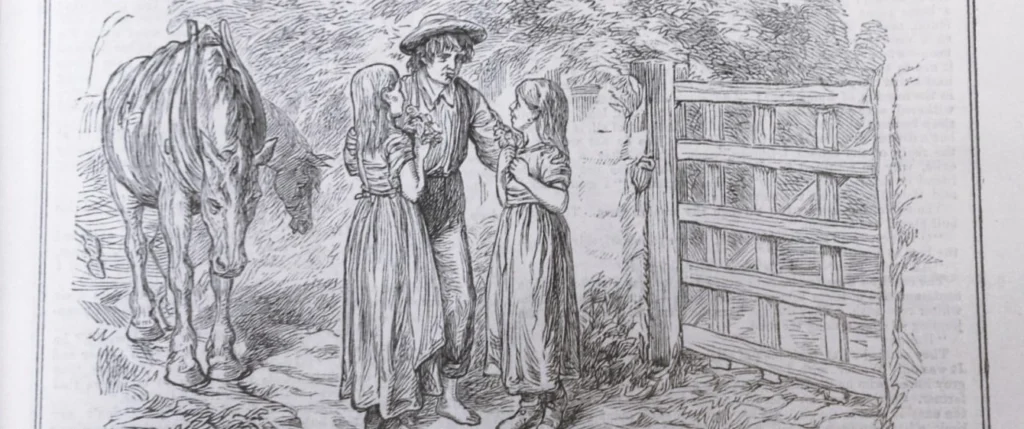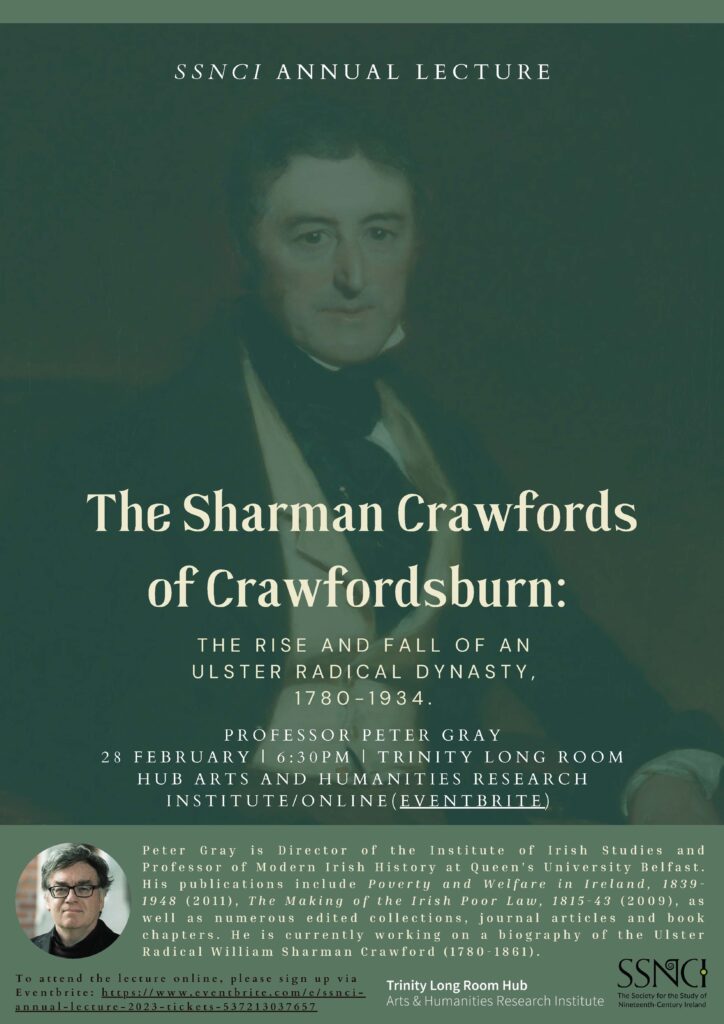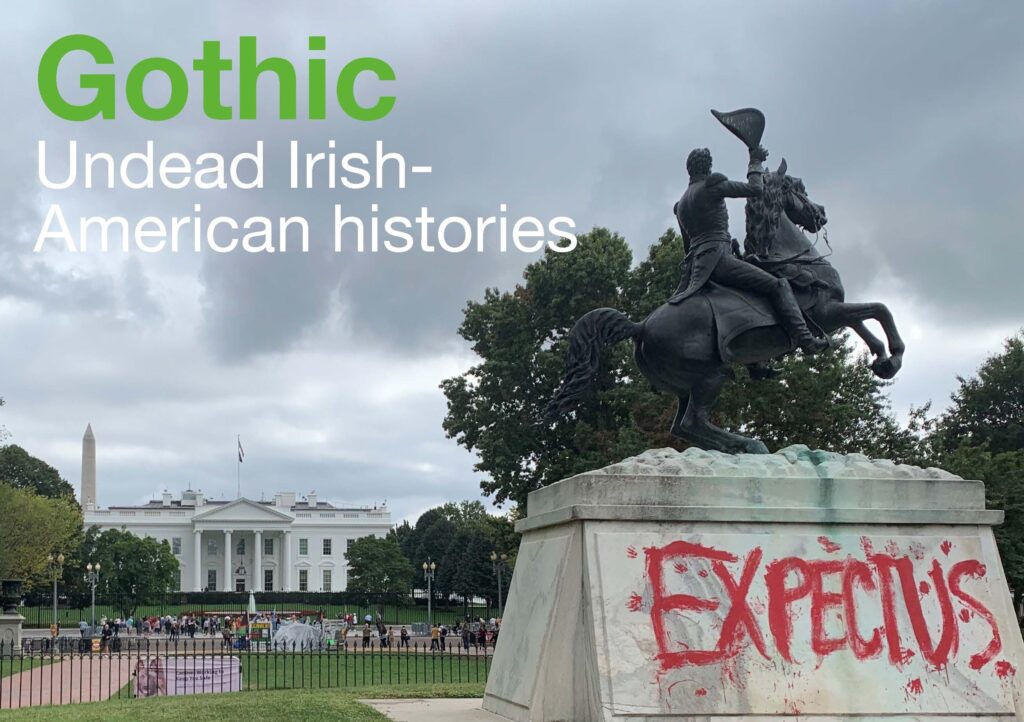Each year we have an annual lecture, and since 2010 these have generally been held online or at the National Library of Ireland. Below is a list of our most recent annual lectures, which reflects the interdisciplinary nature of SSNCI.
2025
 Periodical Famines: Irish Memories in Transatlantic News Media, 1845-1919
Periodical Famines: Irish Memories in Transatlantic News Media, 1845-1919
Dr Lindsay Janssen (Radboud University), 6:30pm-7:30pm 28 February 2025
Venue: in person, The National Library of Ireland, tickets free but booking essential (here)
The Great Famine (1845–1852), Ireland’s greatest demographic disaster in recent history, has shaped Irish identities around the world and remains a crucial part of Irish memory. Lindsay’s book Periodical Famines reveals how, within the transatlantic periodical market, Irish, Irish American, and Irish Canadian newspapers and magazines acted as carriers and shapers of cultural identities. In outlets such as the Dublin-based magazine Young Ireland and the Montreal Witness newspaper, famine memory was deployed transhistorically to help represent other crucial events in Ireland. In newspapers such as Irish World and Industrial Liberator (New York) and the United Irishman (Dublin) this fund of memory was used transnationally to interpret events outside of Ireland, such as labour issues in the United States and the Second Boer War. During her lecture, Lindsay will explore these links across time and space by way of case studies also involving periodicals part of the NLI’s collections. Moving beyond individual writings to interrogate how different texts printed within an issue influenced each other, Lindsay’s contextual approach reveals the intricate paths that famine memory travelled.
Bio: Dr Lindsay Janssen is an assistant professor at the Department of Modern Languages and Cultures (MLC). She wrote a thesis on Irish and Irish-diasporic popular fiction from the period 1871-91, the Great Irish Famine and cultural identity formation, and obtained her PhD in 2016. Three years later, she was awarded a fulltime individual fellowship by the Irish Research Council. Affiliated to University College Dublin during this fellowship, she researched Irish transatlantic periodical culture between the mid-nineteenth and early twentieth centuries. Between 2020 and 2023, Lindsay was part of the Heritages of Hunger research project (NWO/NWA). For this project, she studied educational practices concerning the Irish Famine in schools, museums, and the heritage sector; she was also the coordinator of the project’s open-access educational repository (currently in development). Together with colleagues from German, Dutch, French, and Spanish, Lindsay researches literature education in Dutch secondary education.
2024
‘Gothic: Undead Irish-American histories’
Prof. Mary Burke (University of Connecticut) 7pm (Irish time) Wednesday 13 March 2024
Prof. Burke’s lecture will be broadcast via Zoom. Click here to book a (free) ticket.
The Irish ‘whitened’ multiple times in the Americas, as conveyed by literature and by figures from Andrew Jackson to Grace Kelly. This lecture on representations of Irishness in the slave-holding Caribbean, on America’s frontiers and antebellum plantations, and in its nineteenth-century northeast examines the forcibly transported Irish, Ulster Presbyterians, and post-Famine immigrants. It traces the successive racialized coinages (‘Redlegs’; ‘Scots-Irish’; ‘black Irish’) as well as subsequent striving to leave ‘flawed’ whiteness behind of such Irish cohorts.
In portrayals of conflicted nineteenth-century Irish America by Mitchell, Fitzgerald, O’Neill, and Yerby (an African American writer of Scots-Irish heritage), the Irish are both colluders and victims within America’s racial order. Depictions negotiate evolving Irish relations with peoples of colour as well as ‘Saxon’ (Scots-Irish) and ‘Celtic’ (Famine Irish) competition for position in America’s hierarchy of S‘whitenesses.’ For the Jackson and Kennedy generations, the presidency bolstered Scots-Irish and Famine Irish ‘whitening,’ respectively. However, although these presidents are foregrounded, attention to Irish-American queer and multiracial authors, public women, and performers (including the Caribbean-Irish Rihanna) expands standard assimilation narratives. For instance, Grace Kelly’s globally-broadcast ascent to royalty paved the way for final full assimilation and thus for ‘America’s royals,’ the Kennedys (also of Famine-era origin).
Social realist fiction incompletely conveys how the past haunts Irish America. Gothic literature’s stress on the returns of traumatic history better conveys the unprocessed injustices that attaining power (whiteness) entail. Thus, subgenres named ‘Jacksonian Gothic’ and ‘Kennedy Gothic’ are particularly highlighted. In Gothic texts in which Jackson hovers by Poe, James, Faulkner, and Welty, the inequities of disordered colonial Ireland are repeated upon Americans of colour. Additionally, ‘America’s royals’ are framed within Gothic vocabularies of conspiracy and curse. History is Gothic in Irish-American narrative because the undead Irish past replays within US racial contexts.
BIO: Mary Burke, University of Connecticut Professor of English, is the author of Race, Politics, and Irish-America: A Gothic History (OUP, 2023), and collaborated with Tramp Press on the 2022 edition of Traveller-Romany Juanita Casey’s Horse of Selene. Her public-facing work has placed with NPR, the Irish Times, RTÉ, and Faber. A former NEH Fellow at the University of Notre Dame, she was a 2022 LRH Fellow at TCD.
2023
‘The Sharman Crawfords of Crawfordsburn: the rise and fall of an Ulster radical dynasty, 1780-1934’
Prof. Peter Gray (Queen’s University Belfast) 6:30pm Tuesday 28 February 2023.
For the best part of a century between the Dungannon Conventions of 1782-3 and the first Home Rule crisis, members of the Sharman, Crawford and then Sharman Crawford family were never far from the forefront of radical and then liberal politics in Ulster. Over three generations members of the family self-consciously maintained a radical reforming tradition and sought to adapt it to the shifting political conditions of their time. This lecture considers what this tradition constituted, how it engaged with the changing popular politics of the period and why it ultimately disintegrated in the generation that inherited the family name from the 1890s. Gentlemanly radicalism was a not uncommon phenomenon in Irish and British politics in the ‘age of reform’, but proved difficult to sustain over generations given the gravitational pull of gentry status and class preoccupations. The Crawfordsburn family were thus unusual in transitioning from the radical Volunteering politics of both William Sharman and John Crawford in the 1780s-early 1790s, through the democratic, Chartist and tenant right campaigns of William Sharman Crawford in the 1830s-50s, to the Gladstonian liberalism of his son James in the 1870s and pioneering feminism of his daughter Mabel through her long life to 1912. Although reversion to a conservative landed Unionist position ultimately came with the succession of Robert Gordon Sharman Crawford to the family estates from 1891, contestations for the legacy of William Sharman Crawford continued into the early twentieth century as elements of more radical Presbyterian politics continued to challenge the dominance of the Unionist elite. This lecture seeks to recover this strand of northern Protestant radicalism over the long nineteenth century, and relate it to political developments beyond Ulster in Ireland, industrial Britain and the empire.
Prof. Gray’s lecture will be held in person at the Trinity Long Room Hub Arts and Humanities Research Institute, Trinity College Dublin, with a live broadcast via Zoom. Click here to book a (free) ticket.

2022
‘Possessing Ireland: George Petrie and the Translation of Landscape’
Dr. Elizabeth Tilley (National University of Ireland Galway) 7pm Thursday 27 January 2022.
2021
‘Searching for a “normal” Irish person: metrics and race in nineteenth-century Ireland’
Dr. Ciaran O’Neill (Trinity College Dublin) 7pm Tuesday 19 January 2021.
2019
‘Maria Edgeworth and the late Scottish Enlightenment:correspondence and community’
Dr. Jane Rendall (University of York) 6pm Wednesday 16 January 2019.
2018
‘Agrarian Secret Societies and the Land War in late Nineteenth-Century Ireland’
Dr. Laurence M. Geary (University College Cork)
2017
‘Tracking “Bad Bridget”: Criminal and Deviant Irish Women in North America, 1838-1918’
Dr Leanne McCormick (University of Ulster)
2016
‘Powers of Redemption: The Irish Famine as a Crisis of Governmentality’
Dr David Nally, School of Geography, University of Cambridge
2014
‘Maria Edgeworth on the Holyhead Road’
Professor Claire Connolly, Head, School of English, University College Cork
2013
‘Rethinking the language shift in nineteenth cenury Ireland’
Dr Niall Ó Ciosáin, Senior Lecturer, Department of History, NUI Galway
2012
‘Landlord-tenant relations on the duke of Leinster’s estate, c.1838-1903: social memory and reality’
Professor Terence Dooley, Director of the Centre for the Study of Historic Irish Houses and Estates and Senior Lecturer, Department of History, NUI Maynooth
2011
‘When the best British sculptors were Irishmen’
Dr Paula Murphy, School of Art History and Cultural Policy, University College Dublin
2010
‘John Henry Newman and the bonfire of the humanities’
Professor Declan Kiberd, Donald and Marilyn Keough Professor of Irish Studies, University of Notre Dame
2008
‘Politics and the Writing of History in 19th-Century Ireland’
Professor Paul Bew, Professor of Politics, Queen’s University Belfast (held at Queen’s University Belfast, 13 March 2008)
2006
‘Captain Rock: The Irish Agrarian Rebellion of 1821-24’
Professor James S. Donnelly, Jr., Professor (Emeritus) of History, University of Wisconsin-Madison (held at NUI Galway, 13 December 2006)
2004
‘Changing perspective on the nineteenth-century Irish diaspora’
Professor J. J. Lee, Glucksman Chair of Irish History, NYU, (held at UCC, 14 January 2004)
2000
‘After the Burning of Bridget Cleary’
Professor Angela Bourke, Professor (Emeritus) of Irish Language Studies, UCD, (held at Bank of Ireland Arts Centre, Foster Place, Dublin 2, 1 March 2000)
1998
‘Ireland under the Union: towards a balance sheet’ ’
Professor Gearóid Ó Tuathaigh, Professor (Emeritus) of History, NUIG, (held at Bank of Ireland Arts Centre, Dublin, 4 March 1999)

